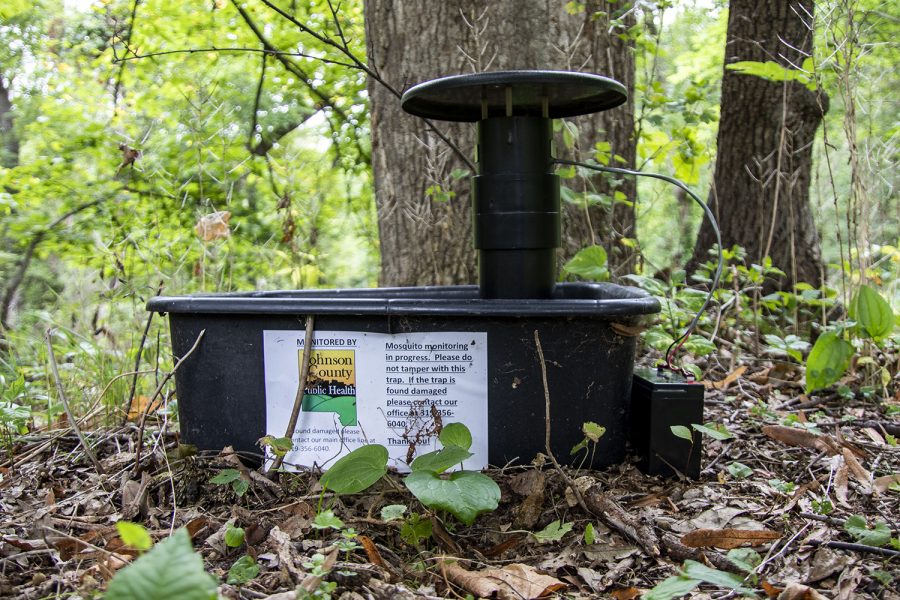Although mosquitos might not be flying around as often right now compared to some sweltering summer nights, West Nile virus peaks at the end of the summer and early fall. Spread through mosquito bites, symptoms can range from a mild headache to disorientation.
In August, the Iowa Health and Human Services Department recorded the first case of the West Nile virus in 2024. The case, out of Harrison County, was reported in an older Iowan between 61 to 80 years old.
In 2023, 17 Iowans contracted the disease, leading to one death. Public health officials and departments across the state are currently working tirelessly to make sure the disease does not become a burden to Iowans across the state.
Robert Kruse, state medical director and the division director of Public Health for the Iowa Department of Health and Human Services, and the Center for Acute Disease Epidemiology oversee policy and control of vector-borne illnesses, including mosquito-borne diseases such as the West Nile virus.
Kruse said that the virus can be particularly damaging to older adults with underlying health conditions. He said West Nile can lead to more severe illnesses affecting the central nervous systems.
“We do a lot of work at the local level, but also at the state level, to oversee disease transmission and activities around West Nile virus here in the state of Iowa,” Kruse said.
Des Moines is not the only part of the state working on this issue. The State Hygienic Lab, located in Coralville, has been testing mosquitos.
Michael Pentella is the director of the State Hygienic Lab at the University of Iowa. Pentella took on the role in 2018 after serving as the Massachusetts State Hygienic lab director. He said there are lots of challenges with infectious diseases.
“There are a lot of visitors from out of the country that fly to Boston, so there are a lot of interesting infectious disease challenges,” Pentella said.
He said the experience from his time out east helps him to understand public health challenges on a deeper level, helping him to supervise the important testing the lab does to aid agencies across the state.
“We do not do basic research, but our testing data allows clinicians to make decisions in the treatment of the patient and allows public health to be informed about where the disease may be occurring. It allows local public health to make decisions about disease control,” Pentella said.
The lab does work with state groups as well as national groups, such as the Centers for Disease Control and Prevention, to keep Iowans informed of the challenges facing them when it comes to the West Nile virus.
“It accumulates over the spring and into the fall, so your risk of getting West Nile virus is greater later in the season,” Pentella said. “August and September, before that first freeze, is when we have a greater risk of becoming infected.”
RELATED: Surveillance reveals West Nile virus risk in Johnson County
The Iowa Mosquito Surveillance Program, run by Ryan Smith, an associate professor of plant pathology, entomology, and microbiology at Iowa State University, recorded some of the highest numbers of mosquitos in 2024.
The State Hygienic Lab does a plethora of testing on the high amounts of the pests to help public health departments make informed decisions to keep the communities of Iowa safe.
“You capture these mosquitoes, and then you freeze them, and then you sort them, and then you gather them up in pools of 50 to 100 mosquitoes,” Pentella explained. “Then you do a test called a polymerase chain reaction on that pool of mosquitoes that you grind up and see if they are infected.”
There are also human tests that take place to investigate if the virus is in the body.
“From humans, we get blood samples and can test for antibodies to West Nile virus. We can also test for [polymerase chain reactions] to test for the genetic material of the West Nile virus,” Pentella said.
The intense testing process works in tandem with state entities to identify the risk of disease and make informed decisions. Smith said they have seen a lot of Culex tarsalis this year, which is a species they have identified as the primary carrier of the West Nile Virus.
After the state collaboration takes place, the final piece in the infectious disease puzzle facing the state is to make an intervention to stop the spread of the West Nile virus.
Dave Williamson, housing services manager at the Public Works Department of Polk County, oversees the mosquito program for his district.
By using a variety of traps and working with the Iowa State research team, Williamson and the mosquito program can protect the unincorporated parts of Polk County.
“One of the preventative measures that we do [is] treat with a larvicide product in the springtime,” Williamson said. “That’s usually done by an aerial application to known areas that hold water and produce larvae that turn into mosquitoes. We treat those [areas] to prevent mosquitoes from hatching.”
However, spraying areas can be burdensome for Iowans and their communities. Williamson stresses the importance of self-protection in preventing the West Nile virus.
“The mosquitoes in question are active at the dawn and dusk time periods. So, if you’re going to be outside during those times, [it] does really put you at risk,” Williamson said.
For Iowans, protection can be as simple as buying bug spray at your local grocery store.
“Using insect repellent, whether it’s deet, keratin, or oil of leptin eucalyptus,” Kruse said. “[I] recommend that any age greater than two months, you can start using deet-based products.”



